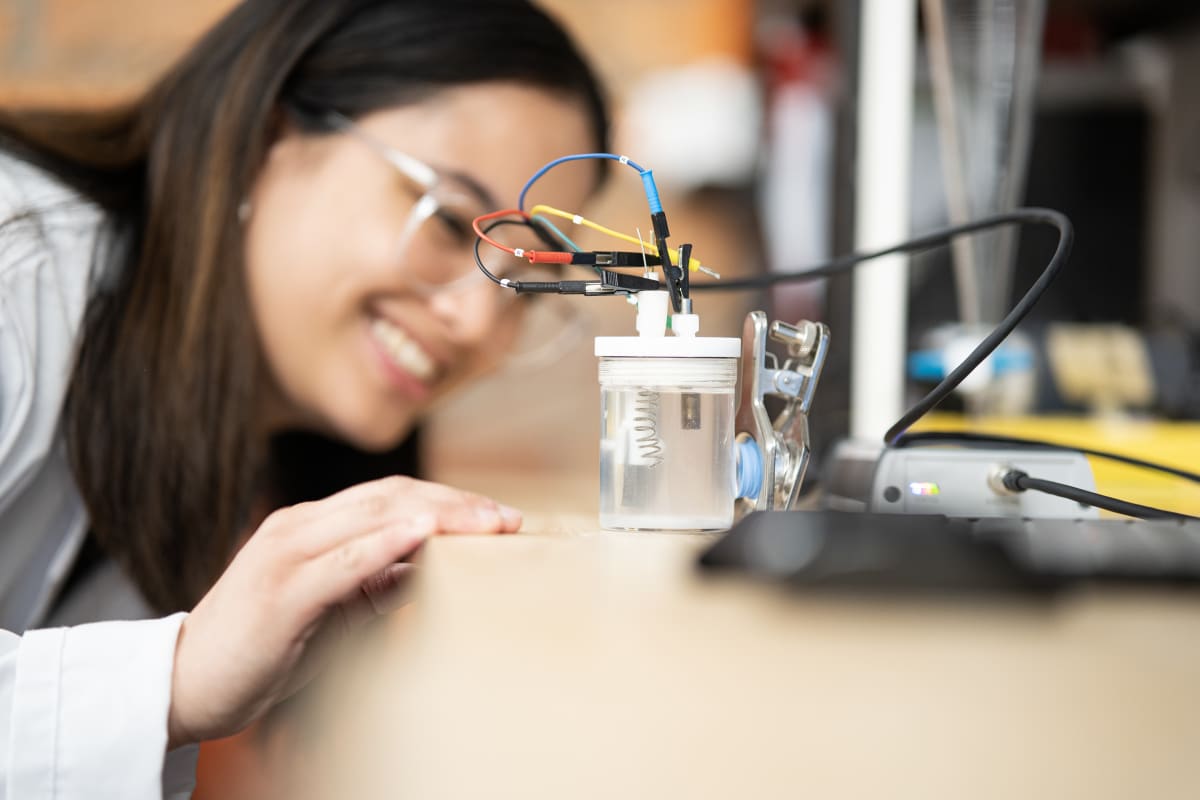
The Prime Minister says this year's $1.6b spend on science and innovation will be increased in the Budget. And it's understood new national research priorities will direct how that money is used, reports Jonathan Milne.
Chemist Kimberly Bañez and her engineer husband Anvil have developed artificial muscles from a super-lightweight, cost-effective actuator that produces motion by inducing force.
It could make a difference everywhere from rehab wards to outer space – but they didn't start in a university. They didn't start in a Crown research institute. They started building prototypes on their kitchen bench at home.
"We didn't spin off out of a university or Crown research institute," says Anvil Bañez, 26. "We only had what money I'd saved. It was very difficult. We're a materials company, we needed chemicals. I was ordering chemicals from overseas to my residential address – they didn't want to give me any chemicals without being a proper laboratory.
"We started as a medical devices company because I wanted to help my dad walk. He has polio. I've always wanted to help my dad walk since I was young. His name's Dennis, and we've named the company after him.
READ MORE: * Applied science stigma holding back high-value economy * Veteran scientist Sir Alan Mark kicks up over climate
"But it now goes far beyond assisting people out of wheelchairs. The material benefits robotics as a whole. We have a lot of interested organisations in medical robotics, aerospace, military and industrial robotics, and we're building them prototypes."
Outset Ventures, an early-state investment fund, put money into their company, Dennisson Technologies, and the couple moved into the shared lab space in Parnell – the same building where Rocket Lab, LanzaTech, Mint Innovation and Pictor started out.
"There is a lot of support for the commercialisation of research coming out of research institutions and universities, but companies like Dennisson Technologies do fall through the cracks here," says Outset chief executive Imche Veiga. "That's largely who we've set out to support."

Companies like Dennisson now get grant funding from the likes of Callaghan Innovation, and the R&D Tax Incentive Scheme – but it's often private money that's first identifying the brilliant commercial opportunities.
The Government wants that to change. Prime Minister Chris Hipkins reveals next month's Budget will have three focuses: science, skills and infrastructure.
The new money will strike a balance between public sector, public good science, and investing in private sector research and development, he tells Newsroom.
"We actually need to lift our game as a country when it comes to our investment in R&D, if we want to stay at the cutting edge of a very, very globally competitive environment." – Chris Hipkins, Prime Minister
"It is a balance," he acknowledges. "If you look at the work that we've been doing around the R&D tax credit, for example, that is about stimulating private sector R&D investment, but there is a need for us to also make sure that we've got our public institutional settings right around R&D, and you'll see some more around that in the Budget.
"R&D that helps us to grow our economy is good. R&D that helps us to improve our quality of life and our way of life is also good."
It comes amid increased pressure to support science – especially applied science – in New Zealand. Earlier this month Callaghan Innovation food technology team leader Owen Catchpole said this country didn’t rank highly on research and development spend per person compared to well-known innovators like South Korea, the United States, Japan and Israel.
Speaking to Newsroom after being named a Fellow of the Royal Society Te Apārangi, Catchpole said New Zealand needs to support leaders with experience in science and engineering, who understand the benefits of investing in R&D to create new high-value products and services "that enable you to compete on the world stage".
Hipkins alluded very briefly to more spending on science at his first pre-Budget speech, to business leaders in Auckland on Thursday.

But he was challenged by Plastics NZ chief executive Rachel Barker, about whether that would extend beyond the universities and Crown research institutes, to private sector R&D.
"Science, for me, is the latest evidence base of what works and what doesn't work and what we can do better in the future," Hipkins responded. "It's about using evidence to inform our decision-making, whether that's decision-making without bringing new products to market, advances in health science, and so on.
"We actually need to lift our game as a country when it comes to our investment in R&D, if we want to stay at the cutting edge of a very, very globally competitive environment."
Science and innovation sector leaders say the new money will accompany a wholesale restructure of the existing Vote Science, which was $1.6 billion last year. That would implement Te Ara Paerangi, the Government's new policy for science, research and innovation across the public and private sector.
The white paper was published in December, and proposes to replace the National Science Challenges with new National Research Priorities.
After the Prime Minister's speech, Barker told Newsroom that there was a lot of good scientific work by small manufacturing companies that was not supported by the R&D tax credits. She said science funding had relied too much on the legacy model of university research. "It was fairly disconnected," she says.
"There are companies at the moment coming up with new bio-based polymers that can be used in agriculture and properly compost into the soil. But they're not necessarily recording those activities that they're putting money into, and not accessing that tax credit."
Imche Veiga agrees: "There is a lot of focus on scientific research, but not necessarily enough focus on the integration of that scientific research into society. We publish a lot of stuff. But the number of science-based startups, for instance, is much lower than you would expect for the kind of research output that we have. I think the commercialisation of that research needs a lot more funding and attention than it currently has."

"If you look at Silicon Valley, a lot of the fundamental research that led to the innovation, that private capital then got into, was first funded by government-funded research institutes.
"Fundamental research is research that doesn't necessarily have an obvious, immediate commercial outcome. It is following your curiosity, seeing where it leads, seeing where the science wants to go, or having questions about how the world works and then wanting to go and investigate them. But not for the purpose of turning it into something commercial immediately.
"I think there's an industry in blue sky research and in commercial research, two very different things. Fundamental research needs to be there, and needs to be government funded. It is the government's responsibility to make sure fundamental research happens.
"And there's so much focus on government funding and commercialisation funding and incubation funding based on intellectual property that has come out of publicly-funded research institutes and universities.
"It overlooks the fact that there are excellent scientists and engineers who are not associated with the universities or research institutes, who still come up with really great inventions. And there's no support mechanism for them to get off the ground."
Science NZ represents the seven Crown research institutes and Callaghan Innovation, that together get about $550m of that Budget through baseline funding and grants, and more through public sector contracts.
Its chief executive Anthony Scott says it hopes to see the national priorities set by a new Research, Development and Innovation Council sitting alongside MBIE, comprising people of mana drawn from government, Māoridom, industry and research.
"Setting the National Research Priorities is going to be tremendously important because you have to have buy-in or legitimacy – they have to be seen as truly important."
He says the seven Crown research institutes are pleased to hear the National Research Priorities will be defined as priorities that are important for the nation, to which research can contribute.
"That means it's about impact, it's about making a difference. It's not about researchers who love their area and would dearly love to have loads of money to do research in that area.
"It's actually about what this country needs, in order to progress economically, socially and sustainably. It's putting those together and then putting substantial sums of money into the National Research Priorities. So you're not just smearing money, you're actually putting a bit of heft behind it – I think that's going to be a substantial element."







